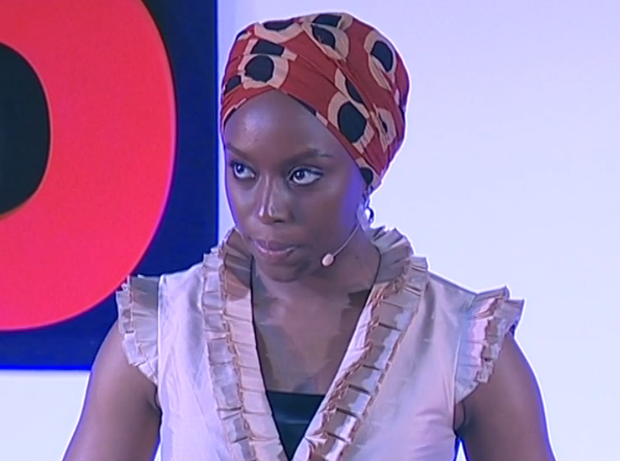Then one Saturday, we went to his village to visit,
后來的一個星期六,我們去Fide的村莊拜訪,
and his mother showed us a beautifully patterned basket made of dyed raffia that his brother had made.
她的母親向我們展示了一個精美別致的草籃--是Fide的哥哥用染過色的酒椰葉編織的。
I was startled. It had not occurred to me that anybody in his family could actually make something.
我當時完全被震驚了。我從來沒有想過Fide的家人居然有親手制造東西的才能。
All I had heard about them was how poor they were, so that it had become impossible for me to see them as anything else but poor.
在那之前,我對Fide家唯一的了解就是他們是何等的窮苦,正因為如此,他們在我腦中的印象只是一個字──“窮”。
Their poverty was my single story of them.
他們的貧窮是我賜予他們的單一故事。
Years later, I thought about this when I left Nigeria to go to university in the United States.
多年之后,在我離開尼日利亞前往美國讀大學的時候,我又想到了這件事。
I was 19. My American roommate was shocked by me.
我那時19歲。我的美國室友當時完全對我感到十分驚訝了。

She asked where I had learned to speak English so well,
她問我是從哪里學得講一口如此流利的英語,
and was confused when I said that Nigeria happened to have English as its official language.
而當我告知她尼日利亞剛巧是以英語作為官方語言的時候,她的臉上則是寫滿了茫然。
She asked if she could listen to what she called my "tribal music,"
她問我是否可以給她聽聽她所謂的“部落音樂”。
and was consequently very disappointed when I produced my tape of Mariah Carey.
可想而知,當我拿出瑪麗亞凱莉的磁帶時,她是何等的失望。
She assumed that I did not know how to use a stove.
她斷定我不知道如何使用電爐。
What struck me was this: She had felt sorry for me even before she saw me.
我猛然意識到:在她見到我之間,她就已經對我充滿了憐憫之心。
Her default position toward me, as an African, was a kind of patronizing, well-meaning pity.
她對我這個非洲人的預設心態,是一種充滿施恩與好意的憐憫之情。
My roommate had a single story of Africa: a single story of catastrophe.
我那位室友的腦中有一個關與非洲的單一故事:一個充滿了災難的單一故事。
In this single story, there was no possibility of Africans being similar to her in any way,
在這個單一故事中,非洲人是完全沒有可能在任何方面和她有所相似的;
no possibility of feelings more complex than pity, no possibility of a connection as human equals.
沒有可能接受到比憐憫更復雜的感情;沒有可能以一個平等的人類的身份與她溝通。











